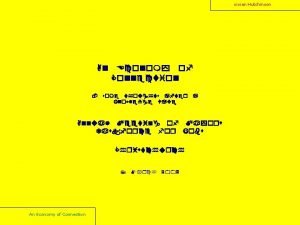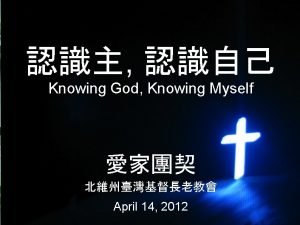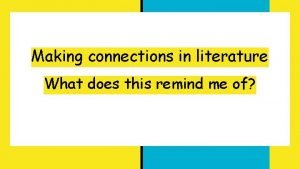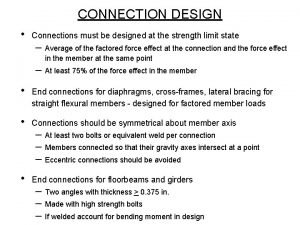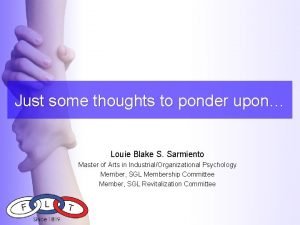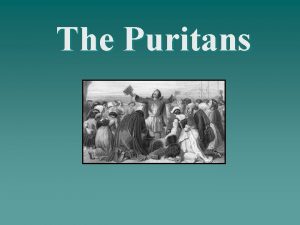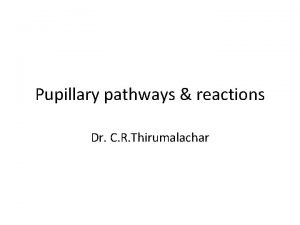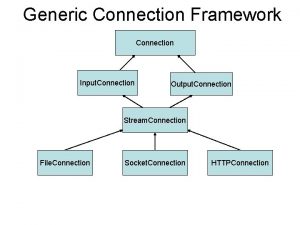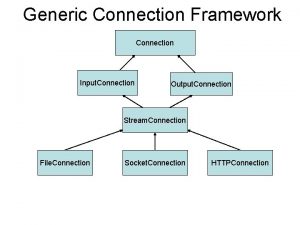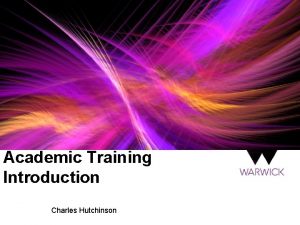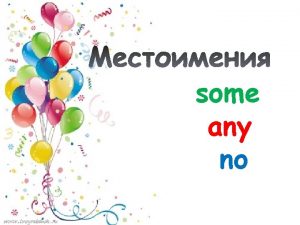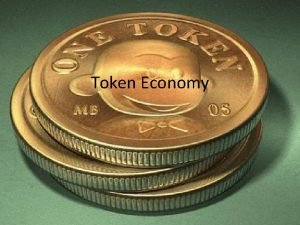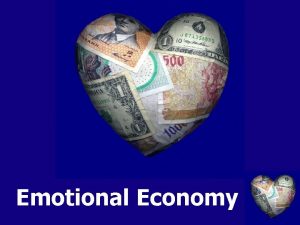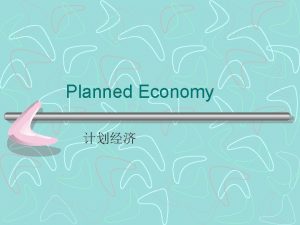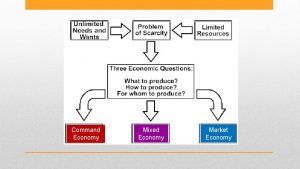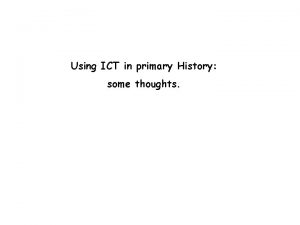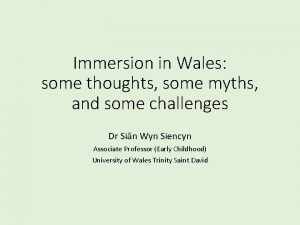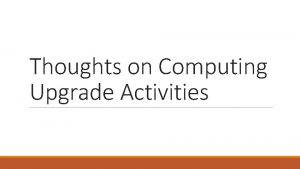vivian Hutchinson An Economy of Connection some thoughts




















- Slides: 20

vivian Hutchinson An - Economy of Connection some thoughts after Knowledge Wave a Annual Meeting of Mayors Taskforce for Jobs Christchurch 7 An Economy of Connection March 2003

Good Times ? This is a good Time to be working on employment issues broken the 5% barrier. . . now down to 4. 9% official unemployment or 98, 000 people figures good news for a Labour governmen t Our question: who’s got the jobs? (although recovery started before Labour came into power) JBL special Statistics That Matter research on the last 4 and half years Good Times ? Who’s got the jobs? see clearly is the major concern: young people under 25 are not getting the jobs despite making up up 40% of the unemployed, only most people making up 14% surprised toof find the of the new two thirds of the jobs are going to people aged 45 years and over (my age group some regions and up) doing very well had 4 and half years most notably of good job but that canterbury growth figure of (increase of 24% both sectors young people with 165, 000 jobs) and unemployment most concerns us interesting : jobs created Taranaki (+22%) and despite business here sinceskill June and shortages lobbies 1998 Wanganui/Manaw suggests to me two sides of trumpeting this is atu (+20%) that NZ over a third the same a business-led businesses are of the new but little problem recovery. . . preferring to jobs gone to movement in the jobs are businesses employ older Maori + Wellington, coming from the are not workers who pacific Nelson, business of people investing in come with people Malborough, the next Health and their skill West Coast and generation politicians would be Southland surprised to levels and work community An Economy of Connection of their services increased attitudes fully find out how much of our current workers - 9/17/2020 in place. workforce by a job creation is being funded by 2

the national conversation will the come closest back thing to the we figure have s to a 2 weeks ago nationa Knowledge l Wave convers Conference ation chairpersonon and most ofideas the Taskforce core group in attendance one of the most diverse group of established NZ leaders gathered in one venue diverse : actors, artists, academics, farmers, fashion designers, central & local government leaders, small business owners, corporate leaders, recent immigrants and fifth generation NZ’ers including 100 younger people from high school students to under 35 yr olds identified as “emerging Knowledge Wave leaders” beamed out to thousands Sky digital TV if going to address our goals. . . going to have to Cullen may be running a apply our Budget but social best minds surplus to deficit. the job 59%isof survey wanted more what the money spent on education leading and social programmes edge like health thinking on our social only 33% use surplus to and cut taxes or pay off economic debt challenges? An Economy of Connection 3 9/17/2020 some cheerleader of this message: NZ Herald (also major sponsor) Special newspaper supplement Herald / Digipoll on criticisms elitist, expensive, too many speakers talking at you, don’t think themes went deep enough not enough opportunity for conversation with each other. missed opportunity but still a for “thinking Fascinating together” overview of NZ’s current challenges much of what naturally bears on our agenda heard a lot as a Taskforce about how we need a better growth strategy in order the economic goal of getting NZ back into the top half of the ranking of OECD countries by 2010 much made of

a social deficit our 4. 9% unemployment rate takes our attention away from the fact that 134, 000 are still on an unemployment benefit one in 12 NZ’ers one in 6 young people a social deficit briefing papers to incoming government show a third of families deficit all know what this Australian High court Justice means in your Michael Kirby, when he offered a communities motto to the Knowledge Wave and conference, when he said neighbourhood “Economics s or you is good - but it is not enough” wouldn’t be it’s here not an either/or situation we have to do both the economic and social concerns together. An Economy of Connection 9/17/2020 single are below the unofficial the same briefing poverty line papers told us that you 4 Maori two thirds of all parent families one in four (26%) Nz children and one in six (16. 5%) working age NZ’ers are dependent on a a social benefit still want a job and can’t get one all these figures have remained at about This is for what we the same levels need to the last ten yearsapply our Knowledge to of course everything is interconnected. . . we certainly do but for most NZ’ers need to raise looking at these our economic social statistics, performance getting back into the elite group of the OECD seems a distant concern. the continuing priority - to address the continuing economic and social gaps that have opened up between our neighbourhoods

goals and 100% outcomes these economic and the social purposes perhaps best come together within the mission and goals of the Mayors Taskforce for Jobs this is why our goals talk about “zero waste of people” The Mayors first goal ask that every young person under 25 in our communities has the opportunity of work or training by 2005 and not the 4. 9% waste of people our not going same full that many the 50 s and . . . but education andwe know that if we address training and employment work is livelihood. . . then so universally many of our other social acknowledged as also start to statistics will how families get move out of poverty 5 An Economy of Connection 9/17/2020 goals we know that there is no parent in our communities bringing up their child to expect that they will not earn a living or make a useful contribution yet this is the case for a large 100% of outcomes number New Zealanders we say “zero waste” because we know andthat 1 in 6 young Governance at people the local and community level about 100% outcomes. and its not simply rhetoric goals acknowledge course we are that Of our to return to the communities are employment world basedofon us grew up in livelihood and 60 s the second goal calls for a complete end to unemploym ent - no matter what age - by the end of this decade is Its about getting the details right our economic goals ask us to get person it right by striving for to the fullest possible employment and the fullest creativity in our community our social goals do ask us to get it right by striving for fullest possible participation and fullest levels of livelihood in our community. these are the 100% outcomes we are asking ourselves to deliver

inclusion Healthy communities not just based on livelihood but also on a spirit of INCLUSION The Mayors Taskforce is essentially a strategy for inclusion. 40% of unemployed in one age group explain it away as “winners and losers” or we have a systematic process of social exclusion taking place blame the victim as being “useless” or having an “attitude problem” if these are good SOCIAL INCLUSION (in times governance terms). . . had “being prepared to best job make the creation for commitments and 15 years investments necessary need to to ensure all make sure people are within we are reach of our bringing all common aspirations” NZ’ers with us Livelihood is a basic common aspiration our communities cannot afford to An Economy of Connection relegate this basic 9/17/2020 human right to a 6 Inclusion SOCIAL INCLUSION “is our capacity and willingness to keep all groups within reach of what we expect as a society” If we it don’t address then group starts to display a combination of linked problems u/e and low incomes + poor skills + poor housing, Nothing new here bad health, high - challenges been crime with us for 10 -15 neighbourhoods + years family breakdown something happening in our country when the most impassioned speech at Know. Wave about closing the gaps between Maori and other New Zealanders. . . comes not from the politicians or the few community reps on the stage. . . but from a corporate advertising executive interesting at Know. Wave Kevin Roberts CEO

Education & Exclusion Good News : top 80% of our students are very competitive and performing to worldclass standards but bottom 20% are systematical ly falling behind, and slipping to the worst in the Western World have extreme inequality in our education system we debate it, we what I measure it most (decile 1 -10) learned but seem unable to from deliver anything Know. Wave different was the Hattie: we because our fact that we are the more successful NZ is and should only young people clearly be - proud country are able to be practicin of them where their more mobile g an Education standards and overseas education Exclusion are getting of (follow their worse, not exclusion teachers. . . better the “zero the Know. Wave Prof John waste of Trust estimates Hattie NZ’ers” has to have 1 million university start in our ex-patriate ofschools NZ’ers) auckland a 1996 a third of just can’t literacy the average is it any our students cut off the study showed ability our wonder that leave of school bottom 20% that 42% of stay-at-home this process at or before and let them working workforce is of exclusion the minimum drift while NZ’ers scored decreasing. starts to leaving age we below the effect our with no school concentrate minimum economic qualification on the literacy performance? s success rate stories An Economy of Connection a third of meaning 9/17/2020 the we’ve got to they could 7

connection major studies done on how “connection” makes a difference Healthy communities built on something deeper than inclusion built by actively fostering CONNECTION a major US study of young people shows “independent of race, ethnicity, family structure and poverty status, young people who have a sense of connection with parents, schools and Connection community are healthier than those who are not” you can only keep up the systematic exclusion of a whole group of fellow NZ’ers if you. . . so havethe no longreal term sense of economics connection of staying to them connected with these this is what young has to people is change. not to be laughed An Economy of Connection at! 8 9/17/2020 connection outs a deeper face to the concept of social inclusion about us turning up and being present in the lives of younger people having healthy linkages with whatever This “keeping in young people care touch” pays off about You could even say there is an “economics of connection” an economics that certainly stacks up in long-term take the financial costs the of young people NOT beinng in employment or education British study - into the long-term financial costs of young people 16 -18 not being in education, training or employment at 97, 000 Pounds each Maharey’s office looked at these figures and translated them to NZ context. Estimate $10, 000 young people in NZ in this age group. if in education or training long term

Putman’s address book SOCIAL at Knowledge Wave foremost intellectu al proponents of the economics of connection Professor Robert Putman popularise d concept of social capital CAPITAL defined as “connections among individuals social networks and the norms of reciprocity and trustworthiness that arise from them” Putman’s Putman gave examples of how we are losing our social capital at the moment and how you can give this social capital an economic value address book made : me consider should we give all young people on our training schemes an address book 9 An Economy of Connection 9/17/2020 and do everything we can to help them grow their social connectivity Putman and the address book at end of five year college education their address book has more capital value than their degree.

design for connection I’ve been sitting with a strategic question over the last year: Would you do a better job than the existing agencies? Sweden - local authorities obliged to take responsibility for young people up to age 18. - They draw up a personal plan which is reviewed every 10 weeks. - Emphasis on no-one “falling If Steve through the cracks” Maharey suddenly turned Denmark “carrot and stick” if around and refuse to work with local best practice made local authority, their income studies overseas authorities support is effected. . . while responsible for Design for a emphasis on Connection researching and the positive connection case for a reciprocity employment and Taranaki training project focused outcomes of all on young people under 25 Knowledge in Wave OECD John their area Martin UK redesigning. . . how would their transitions Director of Employment, you design it? programmes Labour and Social (Okay. . . Affairs come up with a imagine Steve model actually what works? a lot didn’t gave you all called OECDare conclusion what works are really work and the resources Connexions the just political strategies for “activation” of you would need unemployed palliatives system to to do it. . . ) emphasise being not work schemes but regular in relationship interventions and case management withinto the young designing individual pathways An Economy of Connection people participation, training and employment 9/17/2020 10

the business case Not just rhetoric. These questions of designing for connection and inclusion are starting to become better understood by many of New Zealand’s leading businesses looking to get away from the “capitalism of exclusion”. . . by the guy who designs their ads In wrap. Tindall up speech Foundation in to the partnership with Knowledge Jobs Research Wave, Trust to get in Warehouse behind Mayors founder projects Steven Tindall catalysed at spoke of least $1 his million of support projects and for the hundreds of Mayors young people Business Taskforce. The into employment for Jobs case or training a major reason for the business And Unions council. . . partnership with the. This meeting has seen the Mayors CTU sign-up Taskforce also to a communities partnership with high An Economy Connection with ofthe 9/17/2020 youth Mayors 11 Rodger today is here see website for you’ll examples hear later today City Care in this city as an example contract services to local authorities in Auckland & Chch 500 staff but an ageing workforce in as traditional labour intensive work Called employment Catalyst. . . want to be a catalyst for social entrepreneurship recognise that the answers are not going to be found with the usual suspects NZ Business Council later this month to launch their industry guide to youth employment “the business case” for getting involved in youth employment issues Tindall describes it as “addressing the disconnect” between businesses and the skills, energy and perspectives that young people can offer. the disconnect: obvious: is

Two main strategies so far. . . partnerships include mayors & councils government Mayors Taskforce operates mainly through partnershi ps significan t point not to stand on the outside and criticise but get in there and ask what can we do together depts business & unions / community groups some . . . think wider future as a civil society movement youth groups / church groups & more Two main strategies 1. they are (even about more expect our An Economy of Connection 9/17/2020 and Two main strategies: 1. setting cultural goals for employment and training 2. asking local agencies to “raise their game”. on these issues cultural goals are the “zero waste people” goals already spoken of they not 12 govt our “what are for” rather than people in this by themselves in getting a closer room success totally dependent partnerships we weave success “how to” “stretch” goals of a stretch as we get the 2005 date). the of wide on to do to it the buy-in to

oz national taskforce Our capacity to reach these goals is also totally dependent on the second point: asking the existing players to “raise their game”. two years ago Australians did a major taskforce on youth employmen t and transition issues in 2001 again. . . can’t just do this from the outside and about throw talk rocks at partnerships agencies all the time that aren’t but rhetoric performing not matched byhave realto get in alongside progress or them real change partnerships just become an elegant reperformanc e of the status An quo Economy of Connection 13 9/17/2020 A charter for the human rights of young people (distribut e copy here) Raise the Game shown this to local youth workers and funding agencies could have been written here in NZ similar remarks to PM Taskforce in 1994. . . and we have been repeating for 10 years working together the missing is cultural and paradigm shifts agencies to together work integrated support networks focused and collaborative partnerships

Tamihere at Knowledge Wave really pleased that Tamihere spoke up at Knowledge Wave pleased that a voice from the community sector is around the we have an cabinet table appalling speech very understandin much like g of saying the partnership emperor has no clothes we can do Tamihere knows that, like education, the welfare system needs fundamental change community workers are very familiar with his arguments 15 agencies one family and we need to had his make. Tamihere more sense of the of itown at version the local“dis-connect” level by state agencies to solve the at the dance -not going to Tamihere put problems of Knowledge put out the up with businesspoverty and press as-usual Wave welfare release dependency take the photo actually results Again, the economics of dis opportunity in the -connection here makes no allocation of but let’ssense not whatsoever change greater John will no doubt be business-as. I don’t resources agree with to all familiar with the 1998 usual those agencies his conclusions or Manukau report on the recommendations, direct and indirect costs of when theybut have agree already with his call. every young unemployed proven to talk about it. person under 25 yrs themselves we do need much more Ernst & Young estimated poorly adapted of a national $58, 760 for each and to solving the conversation about every young person problems” An Economy of Connection 14 the existing 9/17/2020 disconnection : “failure just where welfare is going (the speech is on

need to raise our game - culturally on public service Yes, like John, ask for a national conversation on the future of welfare but goes deeper than that Missing ingredient in “partnership” is our capacity to work together Missing ingredient the skills of cooperation, coordination and collaboration skills of sharing power across a number of agencies I believe it goes to the heart of what we may ut not just in mean by government : public departments service” (Donna Awatere Huata is perhaps the most recent example of this) sense of entitlement that just seeps up through organisations you start off doing good work / then you think something is owed An Economy of Connection to you / your 9/17/2020 lifestyle needs 15 is Public Service of course the general public noticed that’s why there was such a public outcry when Christine Rankin and Winz bosses hired a plane to fly to the Wairekei. . resort public service become defined by not how much you protect your patch and privileges but by how much you offer leadership to the task by working well with 90 s a a whole dark decade variety of groups and government organisations who depts redefined share your public themselves as purpose businesses community groups redefined themselves as contractors fellow citizens became fellow wasn’t all bad many consumers good changes at lost a generation this time as well of co-workers lost a deeper conversation with one another about what it is to be a public servant. rise of cynicism and self interest and sense of entitlement in

what we ask of each other sorely in need of a public conversation on just what we mean by public service We need to ask the question” just what is it serving? The Labour govt has done a great job in calling for a change of culture in public service. . . Taskforce seeing some evidence of this Public service won’t raise its game by political dictate not necessarily question of management or different performance targets or reporting structures To me, Public what we ask service is the of each ability to get in the room other and ask yourself the questions: what is theyou are in a unique governance position to public purpose ask for more here? is a door What value. Taskforce am for different I adding here agencies to work for the together common good? The Mayoral call to “raise the game” amongst your local community agencies and local government An Economy of Connection departments may be 9/17/2020 16 change culturally change by what we are prepared to ask of each other a question of an old-fashioned word - character every example of cynicism and selfinterest had another New Zealander sitting next to them that didn’t speak up whole plane-load Mayors can of people who speak up didn’t speak up we can ask to more from each other this taskforce started because seven mayors said “we are going to ask for more from ourselves and each other”

Coda — unreasonable goals asking more of each other brings us back to “connection ” we cannot ask more of each other the cultural unless we goals of this are taskforce connected speak of in a real the way sort of NZ we want to live in and when we are better connected to our young people and their transition into working adults then we need to be prepared for the fact that they will actually ask more of us and when we are better connected to our young people and their transition into working adults they’ll ask us to make sure that there are the opportunities available to them when they leave school or finish their training. then we need to be prepared Coda for the fact that they will actually Well, yes we ask more the “zero are!. of us waste of New In their Zealanders” It would have final is the sort been great if presentation of vision the Know. Wave to the that we need conference had conference our best ended with a they turned minds and unified call to these hearts get in behind messages working on. the goals of back on the Mayors and part of their Taskforce our elders by leadership there’s asking: Economy of Connection task An today inspiration here 9/17/2020 do YOU have is to keep a. . . and 17 Back to the Knowledge Wave. . . The final session included a presentation from the younger not unlike “emerging most young leaders” people to I the know rest of us. . . they had obviously become tired and perhaps a little suspicious of the TV personalities, celebrity sportspeople and elite corporate cheerleaders telling them “nothing is

Slide Sub Heading Title Here Lorem ipsum dolor sit amet, consectetu er adipiscing elit, sed diam nonummy nibh euismod tincidunt ut laoreet dolore magna aliquam erat volutpat. Ut wisi 18 Lorem ipsum dolor sit amet, consectetu er adipiscing elit, sed diam nonummy nibh euismod tincidunt ut laoreet dolore magna aliquam Lorem ipsum dolor sit amet, consectetu er adipiscing elit, sed diam nonummy nibh euismod tincidunt ut laoreet dolore Template magna Tools aliquam erat volutpat. Ut wisi Lorem ipsum dolor sit amet, consectetuer adipiscing elit, sed diam nonummy nibh euismod tincidunt ut laoreet An Economy of Connection dolore magna 9/17/2020 Lorem ipsum dolor sit amet, consectetuer adipiscing elit, sed diam nonummy nibh euismod tincidunt ut laoreet dolore magna aliquam erat volutpat. Ut wisi

Slide Sub Heading Title Here Lorem ipsum dolor sit amet, consectetu er adipiscing elit, sed diam nonummy nibh euismod tincidunt ut laoreet dolore magna aliquam Lorem ipsum dolor sit amet, consectetu er adipiscing elit, sed diam nonummy nibh euismod tincidunt ut laoreet Lorem doloreipsum dolor magnasit amet, aliquam consectetuer erat adipiscing volutpat. elit, Ut wisised diam nonummy nibh euismod tincidunt ut laoreet dolore magna aliquam erat volutpat. Ut wisi An Economy of Connection 19 9/17/2020 Lorem ipsum dolor sit amet, consectetu er adipiscing elit, sed diam nonummy nibh euismod tincidunt ut laoreet dolore Template magna Slide aliquam erat volutpat. Ut wisi Lorem ipsum dolor sit amet, consectetuer adipiscing elit, sed diam nonummy nibh euismod tincidunt ut laoreet dolore magna aliquam erat volutpat. Ut Lorem ipsum wisi dolor sit amet, consectetuer adipiscing elit, sed diam nonummy nibh euismod tincidunt ut laoreet dolore magna aliquam Lorem ipsum erat volutpat. Utdolor wisi sit amet, consectetuer Lorem ipsum adipiscing dolor sit elit, sed amet, diam nonummy consectetue nibh euismod r tincidunt ut adipiscing laoreet elit, sed dolore magna diam aliquam erat nonummy volutpat. Ut nibh wisi euismod tincidunt ut

overview / mind-map good times and who has got the jobs? Social inclusion and connection Knowledge Wave Kevin Roberts capitalism of exclusion social statistics the US study and connection The economics of connection -manukau report - british report -Rubert Putman social capital Mind economy manangement harry of household potter The Mayors Taskforce as strategy for inclusion -setting community goals for employment - asking agencies to “raise their Tamihere on game” welfare reform Map the culture of public service and trust we need to defined not cynicism and self get our capacities -interest the household in but choices ceg story order choices for in community and an economy a common state of inclusion good it changes and culturally not connection by performance and thinking targets towards theof Connection An Economy next 9/17/2020 by what we are 20 a experience from Australia transitions report human rights charter wholistic approach experience from connections and working changemakers together is framework the key missing the taranaki ingredient initiative taskforce as adding door for governance and central making and it local govt working together
 Vivian hutchinson
Vivian hutchinson My thoughts are higher than your thoughts
My thoughts are higher than your thoughts What are text to text connections
What are text to text connections Bolted connection
Bolted connection A325sc bolts
A325sc bolts Minimum fillet weld size
Minimum fillet weld size Athens and sparta were both
Athens and sparta were both Some thoughts to ponder
Some thoughts to ponder Atitude emprostótono
Atitude emprostótono Anne hutchinson and roger williams
Anne hutchinson and roger williams Bryce hutchinson wikipedia
Bryce hutchinson wikipedia The scarlet letter chapter 2 annotations
The scarlet letter chapter 2 annotations Erytromicyn
Erytromicyn Sifilis lesiones
Sifilis lesiones Hutchinson sign eye
Hutchinson sign eye Anne hutchinson 1637
Anne hutchinson 1637 Hutchinsons incisor
Hutchinsons incisor Wernicke's hemianopic pupil
Wernicke's hemianopic pupil Higoumenaki sign
Higoumenaki sign Triade di hutchinson
Triade di hutchinson Spirometer inventor
Spirometer inventor
